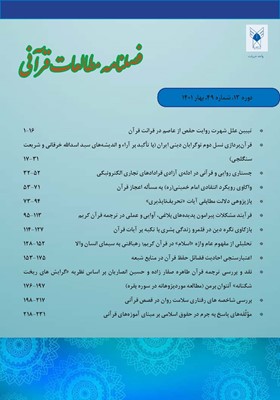نقد و بررسی ترجمه قرآن طاهره صفار زاده و حسین انصاریان بر اساس نظریه «گرایش های ریخت شکنانه» آنتوان برمن (مطالعه موردپژوهانه در سوره بقره)
محورهای موضوعی : فصلنامه مطالعات قرآنیگودرز کاکاوندی 1 , محمدحسن معصومی 2 * , محمدرضا یوسفی 3
1 - دانشجوی دکترای تخصصی زبان و ادبیات عرب، دانشگاه آزاد اسلامی، واحد قم، قم، ایران
2 - استادیار گروه زبان و ادبیات عرب، دانشگاه آزاد اسلامی،واحد قم، قم، ایران
3 - استادیار گروه زبان و ادبیات عرب، دانشگاه آزاد اسلامی،واحد قم، قم، ایران
کلید واژه: آنتوان برمن, ترجمه, قرآن کریم, حسین انصاریان , طاهره صفارزاده, سوره بقره,
چکیده مقاله :
ترجمه بهعنوان تلاش و فعالیتی هدفمند جهت رفع موانع زبانی و فرهنگی، و زمینهای برای برقراری و گسترش روابط میان انسانها در سطوح مختلف از دیرباز مورد توجه بشر قرارگرفته است.آنتوان برمن در نظریه گرایشهای ریخت شکنانه خود با هدف برجستهسازی اهمیت دیگری و فرهنگ بیگانه در ترجمه به بررسی شیوهها، سازوکارها و راهبردهای ترجمهای مترجمان در انتقال غرابت و بیگانگی متن اصلی به زبان مقصد پرداخته است. از این رو در پژوهش حاضر، از دیدگاه آنتوان بِرمن مؤلفه هایی همچون: عقلایی سازی، شفافسازی، اطناب در کلام، تفاخر گرایی، غنایی زدایی کیفی، و غنایی زدایی کمّی و دیگر عناصر را در ترجمه های فارسی طاهره صفارزاده و حسین انصاریان از سوره ی بقره مورد بررسی و نقد قرار می دهیم؛ که از نتایج این پژوهش آن است که طاهره صفار زاده بیشتر از حسین انصاریان این عناصر ریخت شکنانه را رعایت نموده است و به ترجمه معیار آنتوان برمن نزدیک است. با توجّه به اهمیت ترجمه صحیح و روان قرآن کریم، یافتههای این تحقیق میتواند در ترجمههای آتی مترجمان و محققان قرآن کریم اثرگذار باشد.
Translation as a purposeful effort and activity to remove linguistic and cultural barriers and a platform for establishing and expanding interpersonal relationships at different levels have long been considered by humans. Antoine Berman, in the theory of its deforming tendencies, examines the methods, mechanisms, and translation strategies of translators in transmitting the strangeness and alienation of the original text into the target language to highlight unfamiliar importance and foreign culture in translation. Therefore, in the study, from Antoine Berman's point of view components such as Rationalization, clarification, Circumlocution in discourse, froufrou orientation, qualitative and quantitative de-lyrical elements, and other elements in Persian translations by Hossain ansariyan and Tahereh Saffarzadeh from Surah Al-Baqarah, we examine and critique one of the results of this research that Tahereh Saffarzadeh has observed these disruptive elements more than Hossain ansariyan and it is close to translating Antoine Berman's standard. Considering the greatness of correct and fluent translation of the Holy Quran, the findings of this study can be efficient in future translations of the translators and scholars of the Holy Quran.
احمدی، محمد رحیم (1392)، آنتوان برمن و نظریة گرایش های ریخت شکنانه، دوفصلنامه نقد و زبان ادبیات خارجی، سال 6، شماره 10، پیاپی 68، بهار و تابستان: 1-19.
انصاریان، حسین، (1393): ترجمه قرآن کریم، تهران: سازمان دارالقرآن الکریم، نشر تلاوت.
مهدی پور، فاطمه (1389)، پیدایش نظریههای ترجمه، کتاب ماه ادبیات، شماره 41، پیاپی 155، صص 57-63.
صفارزاده، طاهره (1394)، ترجمه فارسی و انگلیسی قرآن حکیم، قم: انتشارات اسوه، چاپ پنجم
صفوی، کوروش.(1371)، هفت گفتار دربارة ترجمه، تهران: کتاب ماد.
کریمیان، فرزانه، اصلانی، منصوره (1390)، نقش وفاداری به یک نویسنده در ترجمه؛ بررسی مقابله ای ترجمه های قاسم روبین از آثار اگریت دوراس، فصلنامه مطالعات زبان و ترجمه، شماره 1، شماره 3، صص 120-138.
_||_The Holy Quran
Simon Sherry, Antoine Berman ou l absolu ctrtique, TTR: traduction, terminologie redaction, vol. 14, n 2, 2001, p 19-29
Ahmadi, Mohammad Rahim (2013), Antoine Bremen and the theory of disruptive tendencies, Quarterly Journal of Criticism and the Language of Foreign Literature, Vol. 6, No. 10, Consecutive 68, Spring and Summer: 1-19
Koosha, Mohammad Ali. Distinctive translations of the Qur'an in the balance of criticism, Qom; Mobin Book Publications
Karimian, Farzaneh, Aslani, Mansoureh (2011), The Role of Loyalty to a Writer in Translation; A Comprehensive Study of Qasim Rubin's Translations of the Works of Egrit Doras, Quarterly Journal of Language and Translation Studies, No. 1, No. 3, pp. 120-138
Mehdipoor, Fatemeh (2010), The Origin of Translation Theories, Book of the Month of Literature, No. 41, 155, pp. 57-63
Simon Sherry, Antoine Berman ou l absolu ctrtique, TTR: traduction, terminology
Safarzadeh, Tahereh (2015), Persian and English translation of the Holy Quran, Qom: Aswa Publications, fifth edition
Safavi, Kourosh. (1992), Seven Speeches on Translation, Tehran: Mad Book
The holy Quran Translated by Mohammad Ali Koosha: www.kooshaa.ir

